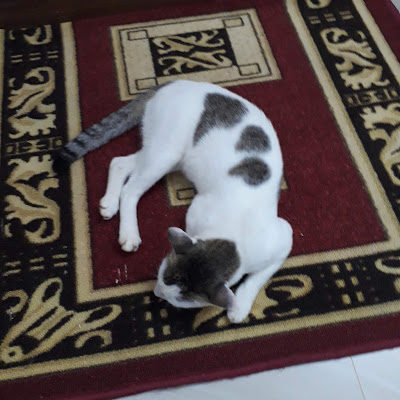Cats and Man
 |
| Kittu established his place at home too soon |
Nevertheless, a cat whom I named Kittu walked into my heart two years ago. He had been abandoned on the roadside near my house by someone who obviously had not cultivated the sensibility that the great philosopher suggested. Even before I realised what was happening, I fell in love with Kittu. When I had to be away from home overnight, I worried about Kittu's well-being.
 |
| Kittu got closer and closer |
Kittu is a great survivor. He learnt to navigate the rugged terrains dominated by rather cruel creatures called human beings. He escaped two attempts of poisoning: some neighbour who was probably annoyed by his frequent trespasses poisoned him. I got him the necessary medication both the times. Kittu was also attacked more than once with some sharp object. I nursed his wounds.
 |
| Kittu could arrest my movement |
Nowadays I make sure that Kittu is well-fed before I leave home for school and as soon as I return so that he won't have to sneak into any neighbour's kitchen. He gets his first dole of milk at 5.30 in the morning so that he will be hungry enough for his breakfast by the time I have to leave home. Kittu taught me to care for someone without any selfish motives.
Yesterday evening, as the sky was just turning dark, my attention was drawn by the loud cries of a small kitten from the same roadside where Kittu had been abandoned two years ago. This time it was a tiny creature that still required its mother's milk and warmth. As soon as it saw me, it came running to me, crying all the way. I gave it some milk. It didn't know how to drink it initially. It learnt slowly. But it couldn't drink much. It is learning now to drink milk. Hunger is a great teacher, I guess.
 |
| Kittu is apparently not quite happy with the new arrival |
How could someone abandon a kitten so small? That question worries me. Couldn't the owner of this tiny creature wait for a few days more, until it would wean itself from its mother?
Little kitten, who made thee? William Blake haunts me again. Did the same god who made human beings create you too?
Lovely post! You are good giving them home. I can now see when you mentioned that you see 'those poses' at home. I am always drawn towards animals except reptiles, a bit scared of them! As a kid I used to bring the stray cats and dogs home much to my amma's annoyance! Now I long to have one at home but it's quite not possible in this flat in Dubai!
ReplyDeleteIt's quite tough to keep pets if you live in a flat. My cats live in open air for most part of the day.
DeleteI happened to watch the Malayalam movie Jellikettu this afternoon. It shows the savage side of man. My cats are benign creatures in comparison.
Such a pleasure to read this post about the bonding between you and the cat/kitten. It is said that man adopts a dog but the cats adopt their caretaker. So you are the chosen one!
ReplyDeleteI tend to believe that because the little creature follows me wherever i go.
DeleteCats, dogs, ducks, rabbits ... a small opening in the heart is all they need and they know how to open it completely! I love both cats and dogs :)
ReplyDeleteTrue.
DeleteCalcium Supplements for pets online
ReplyDelete